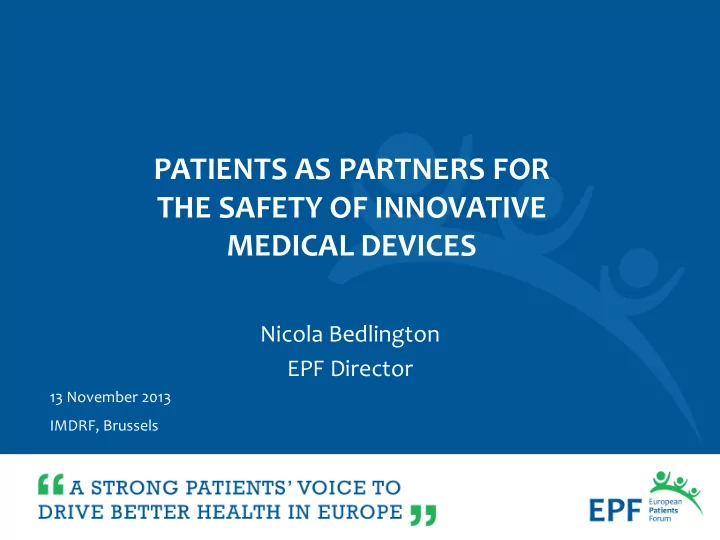

PATIENTS AS PARTNERS FOR THE SAFETY OF INNOVATIVE MEDICAL DEVICES Nicola Bedlington EPF Director 13 November 2013 IMDRF, Brussels
About the European Patients’ Forum • Independent, non-governmental umbrella organisation set up in 2003 • VISION: All patients in the EU have equitable access to high quality, patient-centred health and social care • MISSION: To ensure that the patient community drives health policies and programmes • MEMBERS: disease-specific EU & national coalitions – 61 member organisations
Patient safety: a core priority • Our philosophy “everyone’s business” an open and transparent “patient safety culture” where healthcare organisations are “learning environments” • EC Patient Safety & Quality Working Group – EC Communication (2008) and – Council Recommendation (2009) • Advocacy: EU legislation Eg. Pharmacovigilance, Medical devices • EU Projects on patient safety – EUNetPas (2008-2011) – Joint Action PaSQ (2012-2015) • Building partnerships and collaboration with WHO, health professionals, other stakeholders
The changing role of patients • Patients moving from passive recipients of healthcare to active, involved & politicised actors • Patient-centredness is a key operating principle of EU health systems • EPF: involvement of patients in patient safety & innovation needed both at individual and collective levels • As users who also have expertise as a result of managing chronic conditions in everyday life, patients have a key role to play in contributing to safety and quality of devices, from the innovation process and the clinical evaluation, to post marketing vigilance.
Patients’ central role in safety Individual patients: • Individual patient’s experience of his/her healthcare “journey” • Rich resource of information about gaps and failures in the system Patients organisations: • role in informing & educating patients and health professionals • Effective advocacy through access to the community
Providing feedback on medical devices • At individual level: A vital feature to improve vigilance system in the new proposal for Regulation in the EU: Direct reporting by patients & healthcare professionals. Collecting information about incidents, including these caused by user errors: to improve our knowledge of devices • At organisation level : Patients’ key role in the debate on new EU Regulation to call for patient safety as a core priority. Feedback on key safety issues: scrutiny for high risk medical devices, regulation of reprocessing of single use devices, call for better notified bodies, improved and more transparent clinical evaluation.
Informing and empowering patients • Patient organisations play a core role in developing and communicating quality, unbiased information including on benefit and risks of treatments available to patients • Devices – especially new& innovative devices such as apps etc will increasingly require empowered patients • Example from the European Parkinson’s disease association: “ Parkinson’s essentials” and “parkinson’s in depth”: online information and decision aids for patients with user friendly information on deep brain stimulation and all other treatments, explaining their risks, benefits and contra-indications, questions to ask to healthcare professionals etc... http://www.epda.eu.com/en/parkinsons/essentials/ http://www.epda.eu.com/en/parkinsons/in-depth/
Participating in innovation • EPF strongly believes that people focused innovation , rather than technology focused is essential for sustainability, better health outcomes, and to tackle,not exacerbate health inequalities • Evidence of benefit of a collaborative approach, with patient involvement from the development stage to ensure better trust and confidence of patients in new technologies (http://www.chainoftrust.eu/ http://www.renewinghealth.eu/ )
Participating in innovation • Patients can bring key expertise on their real life needs & challenges, and ethics issues to take into consideration : example of Alzheimer Europe’s report “The ethical issues linked to the use of assistive technology in dementia care ” • provide guidelines on issues such as : consent training of patients and carers, taking into account benefits for the patients when developing technology, Eligibility criteria to consider to ensure access http://www.alzheimer-europe.org/EN/Ethics/Ethical-issues-in- practice/The-ethical-issues-linked-to-the-use-of-assistive- technology-in-dementia-care
The Patient Medtech Dialogue • Established in 2011 first ever structured get-together of the Medical Technology industry with patient organisations • bi annual meeting of EPF and EUCOMED members, 6 th edition in November 2013 • Aim in our Memorandum of Understanding: to develop patient-centred healthcare models in the sphere of medical devices. exchange information on respective positions on important policy developments at EU level develop best practices to uphold the highest ethical standards in the patient-industry relationship, based on independence and transparency.
The Patient Medtech Dialogue (2) • Evolution from a platform to exchange perspective to a structured dialogue with concrete actions planned ahead Concrete deliverables: • A patient focused Session in 2013 MedTech Forum • Ongoing development of a checklist to define what is a patient centred company/ patient centred approach to innovation
EUPATI Launched Feb ’12, runs for 5 years, 30 consortium members, PPP of EU Commission and EFPIA will develop and disseminate objective, credible, correct and up-to-date public knowledge about medicines R&D will build competencies & expert capacity among patients & public will facilitate patient involvement in R&D to support industry, academia, authorities and ethics committees
EUPATI Certificate Training Programme 100 Academic Modular Certificate Programme Patient Ambassadors in committees, R&D teams, … patient Patient Journalists raising awareness advocates Patient Trainers for patient communities & networks EUPATI Educational Toolbox 12.000 Educational tools for patient advocates Variety of distributable formats: Paper-based booklets, patient presentations, eLearning, webinars, videos etc. advocates 100.000 individuals
Final thoughts • Patients are willing and able to contribute to the innovation process and to the safety chain • Increasing recognition that patient centeredness is essential in healthcare innovation • Working together in a collaborative approach including patients, professionals, researchers, industry and decision makers we can ensure patients have access to the safe and innovative device they need
THANK YOU FOR YOUR ATTENTION! Follow us on Social Media! /eupatient /europeanpatientsforum eu-patient.eu/blog /eupatientsforum More information www.eu-patient.eu info@eu-patient.eu
Recommend
More recommend